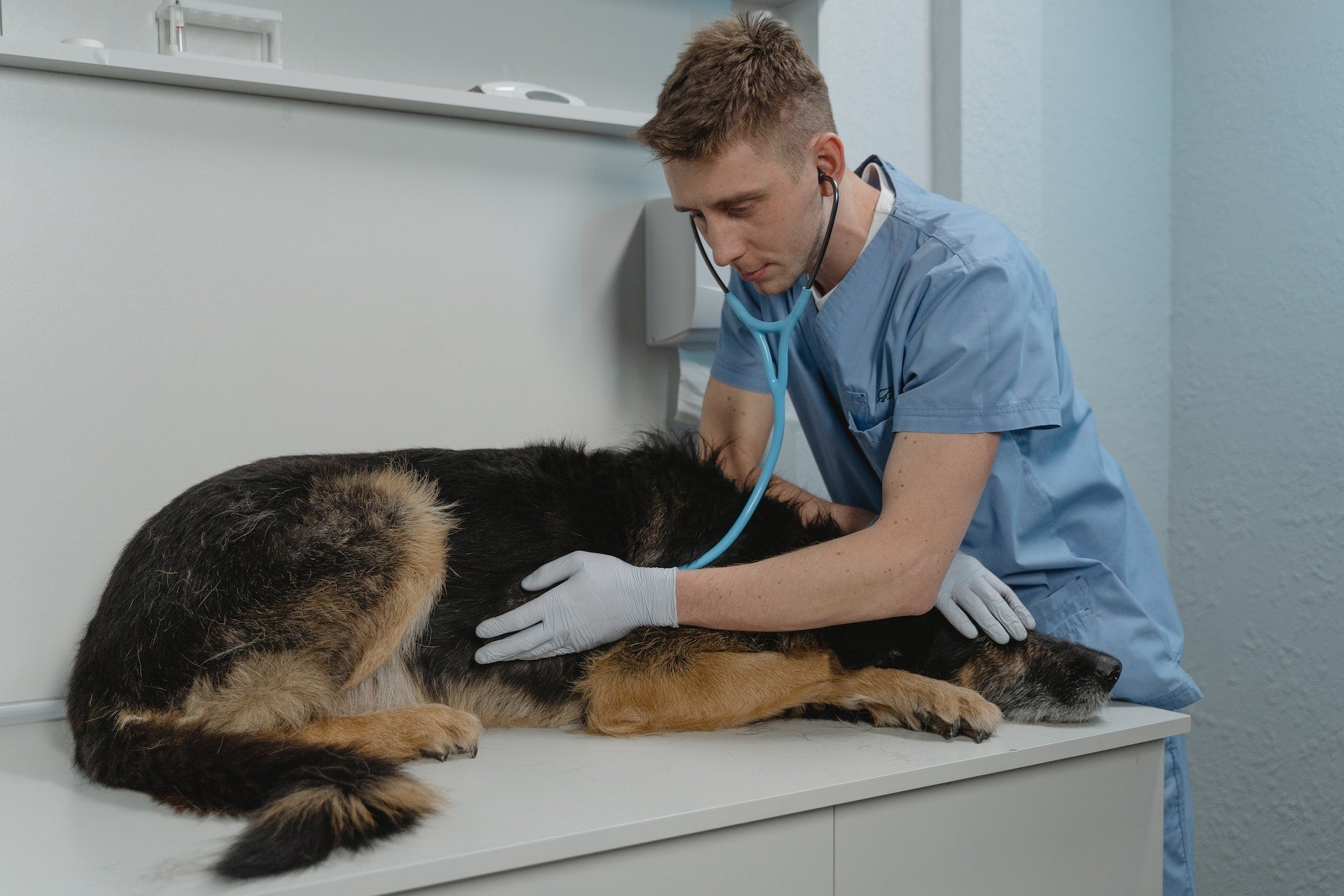As a pet parent, you know that digestive health is a vital aspect of your furry friend's overall wellbeing. Cats and dogs rely on their digestive system to absorb nutrients, fuel their bodies, and keep toxins at bay. In addition, a healthy immune system is dependent on a healthy gastrointestinal system. Sadly, gastrointestinal (GI) disorders can have a big impact on your pet's quality of life, causing discomfort and even long-term health problems.
In this post, we'll provide an overview of common digestive disorders in cats and dogs. We'll also explore symptoms to look out for, diagnosis and treatment, and prevention strategies. By gaining insights into these aspects, you'll be better equipped to care for your pet's health and ensure they enjoy a long and healthy life.

Understanding Digestive Disorders in Pets
The GI tract is responsible for digesting food, absorbing nutrients, and preventing toxins from entering the bloodstream. It relies on a complex ecosystem of bacteria known as the gut microbiome. However, various factors can disrupt this equilibrium leading to digestive disorders.
Common digestive disorders in cats and dogs include:
- Inflammatory Bowel Disease (IBD). This condition is characterized by chroni inflammation of the intestines and can lead to symptoms like diarrhea and weight loss. The exact cause of IBD is unknown, but it's believed to be a combination of genetic predisposition, an abnormal immune system response, and environmental factors such as diet or infections.
- Protein-Losing Enteropathies (PLE). PLE involves excessive protein loss from the GI tract, which can cause weakness and fluid retention. It can be caused by conditions that damage the intestinal lining, such as chronic inflammation or tumors.
- Ulcerative Colitis. A condition marked by inflammation and ulcers in the colon, which results in symptoms like bloody stools and abdominal pain. The exact cause is unknown, but it may be related to an abnormal immune response or certain infections.
- Pancreatitis. A disease in which the pancreas becomes inflamed. If left untreated, it can lead to serious GI issues. Causes of pancreatitis include certain medications, trauma, or infections.
- Gastritis. Inflammation of the stomach lining, which often results in vomiting. It can be caused by infections, ingestion of irritants (like certain plants or chemicals), or long-term use of certain medications.
- Gastrointestinal Ulcers. These are open sores in the digestive tract that can lead to pain and bleeding. Causes can include certain medications (like NSAIDs), infections, or diseases that increase stomach acid production.
- Leaky Gut Syndrome. This condition is characterized by increased intestinal permeability, allowing harmful substances to leak into the bloodstream. The exact cause is still under research, but it's believed that diet, stress, and bacterial imbalances might play a role.
Digestive issues in pets can be triggered by various factors. For example, a poor diet (especially one high in processed foods and low in fiber) can lead to problems like constipation. Overuse of certain medications, especially antibiotics, can disrupt the gut's microbial balance, leading to issues like diarrhea.
Infections, either bacterial or viral, can also cause digestive disturbances. Additionally, underlying health conditions, such as hormonal imbalances or tumors, can manifest as digestive symptoms.
Regular checkups and a balanced diet can help in preventing many of these disorders. That's why it's important to schedule regular veterinary appointments and feed a healthy, species-appropriate diet that contains all the nutrients your pet needs to thrive.
Recognizing Early Signs of Digestive Disorders
When it comes to digestive disorders, it's important to be aware of your pet's behavior and physical condition. Detecting problems early on can significantly improve the chances of successful treatment and prevent further complications.
Here are some signs to look out for:
- Changes in appetite. If your pet's appetite suddenly increases or decreases, it could be an indication of digestive issues.
- Altered bowel movements. Pay attention to constipation, diarrhea, or the presence of blood in the stool as these may indicate a problem in the GI tract.
- Vomiting. Occasional vomiting might be normal, but frequent or chronic vomiting requires veterinary attention.
- Abdominal pain or bloating. If your pet appears uncomfortable or shows signs of pain in the abdominal area, it could be a sign of a digestive disorder.
- Lethargy or behavioral changes. Unexplained fatigue or changes in behavior might be linked to underlying digestive problems.
By being mindful of these signs and promptly consulting with a veterinarian you can ensure that any potential digestive disorders are identified and treated early on. This proactive approach can help prevent complications and contribute to your pet's long-term health and happiness.
The Role of Virgin Coconut Oil in Digestive Health
Virgin coconut oil (VCO) is a valuable natural remedy that enhances nutrient absorption and digestion in pets. The medium-chain fatty acids (MCFAs) in VCO enhance nutrient absorption and keep parasites at bay. Its anti-inflammatory properties aid in healing digestive tract injuries and can even help combat bad breath.
Research has shown that while virgin coconut oil is antibacterial, it does not kill beneficial bacteria in the gut. MCFAs in virgin coconut oil support beneficial bacteria in the gut and eliminate only bad, pathogenic bacteria and help fight numerous bacterial infections.
Coconut oil is well-tolerated by pets with pancreatitis and can replace lost calories in pets with Protein Losing Enteropathy (PLE). For these reasons, VCO can be used as a preventive measure to maintain a healthy digestive system. Its antibacterial and antiviral properties contribute to a balanced gut flora, promoting overall digestive health.
In a nutshell, adding VCO to your pet's diet can help support their digestive health in a simple and effective way. Check out our previous post to learn more about using virgin coconut oil with your pets.
Diagnosis and Treatment of Digestive Disorders
Diagnosing GI diseases accurately is crucial, as it guides the treatment plan and ensures the best outcome for your pet. The diagnostic process often involves a thorough examination, describing symptoms to the vet, blood tests, imaging, and sometimes even endoscopy.
Treatment options are multifaceted and tailored to the specific disorder. Your pet's diet is a key component of recovery, as it aims to reduce inflammation, restore the balance of gut bacteria, and provide essential nutrients.
Medication is often used in combination with dietary changes to treat symptoms and control inflammation. Hydration is maintained through fluids, and natural supplements like virgin coconut oil can support healing.
Finally, supportive care and ongoing management, including regular follow-ups with your vet, are essential for pets diagnosed with chronic GI issues. If your pet is diagnosed with a digestive disorder, speak to your veterinarian to develop a comprehensive treatment plan that works for their individual needs.
Prevention of Digestive Disorders
Preventing digestive disorders is a proactive approach that can save your pet from discomfort and serious health problems. Here are some of the most important preventive measures you can take:
- Feed a healthy diet. Fresh, natural ingredients without chemical preservatives or additives provide essential nutrients without harming the digestive system. A balanced, species-appropriate diet supports healthy digestion and prevents issues like constipation or diarrhea.
- Avoid over-vaccination. Performing a titer test and vaccinating only when necessary helps prevent potential adverse reactions that can affect the gut.
- Provide regular exercise. Helps in maintaining healthy digestion and avoiding obesity, a risk factor for many GI disorders. Regular physical activity stimulates the digestive system and helps maintain a healthy weight.
- Use natural pest preventatives. Using natural tick and flea products and avoiding chemical toxins protects the gut lining from harmful substances that can disrupt digestion.
- Use natural supplements like virgin coconut oil. Coconut oil can promote a balanced gut flora, thanks to its antibacterial and antiviral properties. Other beneficial natural supplements include probiotics, prebiotics, and digestive enzymes.
- Add a healthy soluble and insoluble fiber to support digestive health. A healthy phytic-acid free fiber such as organic coconut chips help support a healthy gut microbiome. When consumed, CocoTherapy Coconut Chips produce short-chain fatty acids (SCFAs), which feed beneficial gut bacteria.
We recommend speaking to a holistic veterinarian to discuss the best prevention strategies for your pet's specific needs. They will be able to recommend traditional and alternative therapies for optimal digestive health.
Are You Ready to Support Your Pet's Gut Health?
Taking care of your pet's digestive health is a crucial part of being a pet parent. Remember, identifying symptoms early and consulting with a veterinarian are key steps to keep your pet healthy.
Making dietary changes, using natural remedies like virgin coconut oil, and following your vet's recommendations can all make a big difference. Just remember to customize the solutions to your pet's specific needs and keep track of their progress through regular vet visits.
By taking proactive measures to keep your pet's digestive system healthy, you can help them stay happy and strong for many years to come.
Want more information about coconut oil and digestive health? Check out our previous blog post, 4 Ways Coconut Oil Supports Your Pet's Digestive System.



